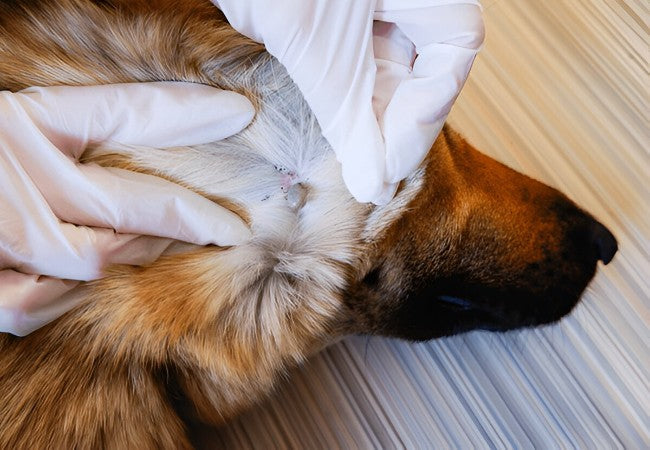Veterinary Guide to Hematuria in Dogs 2025 🩺🐶

In this article
Veterinary Guide to Hematuria in Dogs 2025 💧🐶
By Dr. Duncan Houston BVSc
🩸 What’s Hematuria?
Hematuria is the presence of blood in a dog’s urine, visible as red, pink, orange, brown, or even microscopic traces on urinalysis. It’s always a sign that something is affecting the urinary or reproductive tract 🩸.
🔍 Why It Matters
- Could signal common, treatable issues like UTIs or urinary stones.
- Sometimes points to serious conditions—cancer, kidney disease, trauma, clotting disorders or poisons.
- Puppies and senior dogs are particularly vulnerable.
- Zoonotic risks with certain conditions (like leptospirosis) also matter.
👁️ Clinical Signs & Clues
- Red/pink/orange/brown urine or visible clots
- Straining, painful urination or frequent small urine volumes
- Pale gums (anemia) in severe cases
- Systemic signs—lethargy, fever, vomiting
- Male dogs might show discharge or prostate enlargement; females may bleed due to heat or uterine issues
🧠 Localizing the Bleed
When the blood appears:
- Start of urination: genital or urethral source
- End: bladder origin
- Throughout: possible kidney or ureteral bleeding
🔬 Stepwise Diagnostic Plan
- History & Physical Exam: timing of bleeding, behaviors, trauma history
- Urinalysis & Culture: identify blood, infection, crystals, cells
- Blood Tests: CBC/chemistry to assess anemia, renal health, clotting
- Imaging: X‑rays/ultrasound to detect stones, tumors, or anatomical deformities
- Advanced: CT, cystoscopy, urethral catheterization as needed
🧩 Common Causes & Treatments
1. Urinary Tract Infection (UTI)
Most common cause. Treated with antibiotics based on culture for 7–14 days ± anti‑inflammatories.
2. Urinary Stones or Crystals
- Struvite stones: managed via prescription diet; surgery if large or obstructive.
- Calcium oxalate: surgical removal, cystotomy
- Supportive fluids and diet for prevention
3. Bladder or Kidney Tumors
Include transitional cell carcinoma or bladder masses. Diagnosed via imaging + cytology/biopsy. Treated with surgery, chemotherapy, NSAIDs.
4. Prostate Disease (Males)
- Benign enlargement, prostatitis, or cancer: treat with antibiotics, neuter, or surgery.
5. Kidney Disease & Infections
Pyelonephritis is treated with appropriate antibiotics and supportive fluids.
6. Trauma & Clotting Disorders
Treat bladder rupture surgically; address coagulopathies with transfusions, vitamin K, or immunotherapy.
7. Toxins & Systemic Illness
Rodenticides, lilies, hemolytic diseases—treat with decontamination, vitamin K, fluid support.
🏥 Treatment & Supportive Care
- Antibiotics for UTIs and prostatitis
- Pain relief—NSAIDs, opioids if indicated
- Fluids (oral or IV) for hydration and renal perfusion
- Diet changes for stone prevention & urinary tract health
- Surgery or minimally invasive stone/tumor removal
- Blood products or vitamin K for bleeding disorders
🏡 Home Care & Monitoring
- Encourage fresh water & hydration
- Record urine color, volume, and frequency
- Keep litter area clean to reduce infection risk
- Administer meds as directed & complete full courses
- Follow-up: urinalysis & imaging at 2–4 weeks post-treatment
📱 Ask A Vet Integration
- Tele‑consults: Review urinalysis, meds, and home monitoring remotely
- Medication reminders: Scheduled dosing via the app 📲
- Emergency alerts: Notify vet if signs worsen (straining, no urine, pale gums)
🎓 Case Spotlight: “Maggie” the Beagle Puppy
Maggie’s owners noticed pink urine and frequent peeing. Urinalysis showed E. coli UTI; treated with antibiotics, probiotics, and diet. One month later, urinalysis post-treatment was clean, and Maggie is back to playful pup life!
🔚 Final Take‑Home Messages
- Hematuria is always a sign—never ignore it.
- Common causes need routine treatment; serious causes require thorough diagnostics.
- Full diagnostics ensure accurate diagnosis and treatment.
- Home care & monitoring are critical to recovery.
- Ask A Vet supports every step—from virtual diagnostics to tailored nutrition and monitoring tools.
Dr Duncan Houston BVSc, Ask A Vet founder. Download the Ask A Vet app for remote urinary care support—helping your pup stay healthy, hydrated, and hematuria-free! 🐶❤️






